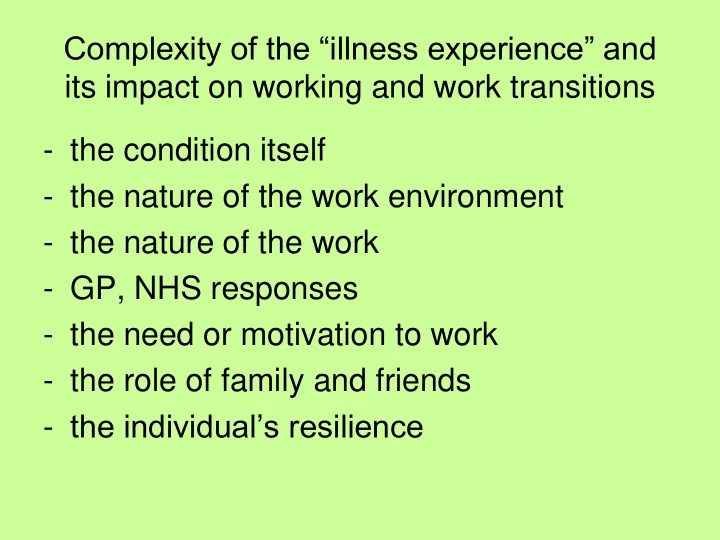

Complexity of the “illness experience” and its impact on working and work transitions - the condition itself - the nature of the work environment - the nature of the work - GP, NHS responses - the need or motivation to work - the role of family and friends - the individual‟s resilience
The condition itself Nature of Work the work environment Illness experience and work Need or transitions GP, NHS motivation to responses work Individual‟s Family and friends resilience
Work environment Policies i.e. Sickness absence Work Line Co-workers Environment management Organisational culture
Nature of work Physical/ mental Degree of Arduous/ discretion stressful Nature of work Un/steady Shift systems workflow
Need or motivation to work Financial Career Benefit structures systems Need or motivation to work Job satisfaction/ Self esteem interest Degree of Escape to discretion work
Family and friends Pressure to work/ tolerance of not working Family and friends Family and Practical support friend examples for work
Managing work and health Colin who is currently 60 had worked for the Police but retired in 1995 going on to work for British Gas for five years. In his forties he had had two heart attacks and a heart bypass at 50. His health continued to be a worry. He had also remarried in his forties and at the time of interview had three children under the age of 16. Two years ago he realised that he needed to scale down his work because of his health, although he wanted to continue working. He went back to working for the Police on the civilian side and had negotiated a job-share arrangement: ‘Obviously because of previous medical problems, I’ve got to be careful what I do, so, as I say, I’m on a job - share, so I’m OK with that because it means that because it’s a shift -system that I work, it means there’s long periods when I’m off…. Well, normally I would work until 65. But obviously with a second marriage and young children I’ve got to keep my options open and also the new age act that’s come in, it opens doors for me that would have been closed previously’ . Source: Vickerstaff et al ((2008) Encouraging Labour Market Activity Among 60-64 Year Olds , Research Report no. 531 DWP.
Heart problems ongoing Benign work Flexibility environment available Illness experience GP, NHS Financial Responses motivation ? Strong push to work ? from family
Working but struggling „Emma‟ is 33, married, with a 10 year old son and works part -time (eight hours a week) for a private Home Care company. She is the main carer for her husband, „Terry‟, who is retired on ill -health grounds following surgery for a brain tumour. He has very poor short term memory and complicated medical needs including incontinence, epilepsy and a complete lack of awareness that he has the condition. „Emma‟ feels under a lot of pressure at home and suffers from tiredness, disturbed sleep, being short tempered and irritable. She gains little emotionally from her marriage and carries a heavy weight of responsibility for both „Terry‟ and their son. She was on anti-depressants for a while but stopped taking them. She does not enjoy her current job and it is not well paid: „ I don’t actually want to work. I used to enjoy working and I don’t think I do….Whether that’s because I’ve not found what I want to do. I work probably to get out of the house and go…get away, not that I don’t think about what’s going on at home and just a bit of income really.’ Vickerstaff et al, Employment Support for Carers DWP Research Report forthcoming
Stress/mental health Flexible but Unsympathetic replicates work caring environment at home Illness Weak experience motivation to Prescribed work – anti-depressants escape to work Some support ?
Forced to give up work Carol worked for over 10 years in a independently run centre for disadvantaged children, having been a respite foster carer previously. She was a day-care leader for pre-school children. The work was increasingly stressful: I mean an example would be that, you know, I went to one particular funeral where I’d buried a mum, her baby of just over a year and her little girl of 3 years and I’d been cuddling those 2 children a few hours before this fire and had got quite a good relationship going with this mum and she finally was able to open up. Carol had to go back to work straight after this event and soon after went on sick leave with headaches and anxiety and never returned to work. Source: Vickerstaff et al ((2008) Encouraging Labour Market Activity Among 60-64 Year Olds , Research Report no. 531 DWP.
Mental health Poor Stressful work management Illness experience Children had GP left home, could rather passive cope on benefits ? ?
Recommend
More recommend